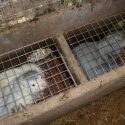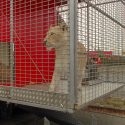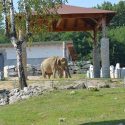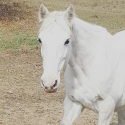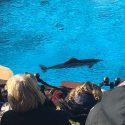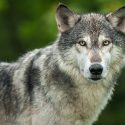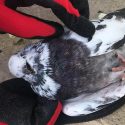Maya’s second life
Maya’s second life
07.11.2018
Italie
Maya’s second life
Exploitation for shows
Freed from the circus thanks to the mobilization of citizens, Maya has started a new life, in Italy, under our attentive gaze and that of our local partners. She remains in captivity and fragile … but she is always in our hearts.
Free from the chains of the circus! No more caged trucks, the never-ending stop overs in parking lots, the silent but very real pain endured by this tired body. While noting her release, the French State did not hear of our association’s organization for the relocation of her into semi-liberty at a sanctuary located in France. The circus that held Maya was able to freely choose what will no doubt be her last home, an Italian zoo, close to circus networks and of which organizes shows with animals.
We are of course happy for her, we decided to follow Maya, to make sure that she was comfortable, refusing to forget her and the distance. Maya now lives in a Safari Park in Pombia, near Novara (Piedmont). The establishment proposes a concept of « safari » on this 45-hectare site with a network of paved roads from where the visitors can circulate by car to approach and view animals of the savannah in a semi-free state or visit the enclosures of some of other animals. This is now the case for Maya.
Our investigators were able to observe her and found that she was better off. Arriving exhausted back in the early part of summer, malnourished, crippled, with osteoarthritis and suffering from an infection on the right hind quarters, Maya has now more going for her. Fed by fresh hay, she can wander freely in her « domain », 5 000 m2 of sloping ground, equipped with a roof to protect her from the sun (but the climate of Lake Maggiore, nearby, is not that of Asia!). A concrete pool that gives her access to water. Maya plays with the earth she takes from the floor with her trunk and delightfully sprinkles her back with it. Yes, earth and no longer tarmac!
We observed a kind of pathway of large raised stones which reduced the space available, without much enrichment and especially that of the access to the stalls (a shed of 220 m2), where Maya could rest out of sight of prying eyes, but which is closed during the day.
The Safari Park of Pombia has welcomed on the Internet the arrival of Maya, its unique elephant, which accredits the usefulness of its association « SOS Elefanti Onlus », claiming an activity to safeguard Asian elephants. Entrance tickets are thus clearly intended to help finance this program … of which it is impossible to obtain concrete information. Claudio Aimone, its scientific director, has never answered our requests for information, any more than about the reason for barring access to the stalls during the day, a common practice in zoos, although it does not comply with the requirements of an animal’s welfare.
So, ever vigilant and supported by our Italian partners of the LAV, we will act to be enlightened on the choices of the type of framework for the second life of Maya. We asked an eminent veterinary expert, Dr. Willem Schaftenaar, adviser to the European Association of Zoological Parks, who had watched the videos recently filmed by our teams at the Safari Park. This is also the case for Prof. Donald Broom of the University of Cambridge, who found the conditions good and without any comparison with those experienced by Maya for decades in the circus. The opinions of these two experts have been attached to the letter we sent to the Italian Minister of the Environment. So that, both here and there, we should be better informed of the fate of these circus convicts becomes a common cause and not just the facts from the owners.
Maya suffers the consequences of a stolen life, exhausted by repeated transportations, the exhibitions in different places and the unsuitable facilities. While now she can regain a taste of the gestures that had been forbidden for decades during her circus life, she obviously had to rehabilitate herself, but especially to be surrounded by appropriate care, including her diet and her physical exercise. A very enriched enclosure, a floor full of sand where she can rest, a real possibility of tranquillity and out of sight in the opinion of specialists, is important to restore Maya, to soothe the physical and mental evils (stereotypy) which weigh heavy on her after a life that has been so hard. All this was relayed to the minister of a country that officially banned wild and domestic animals in circuses. Hope in Italy? here, we have to monitor, interrogate, debate and even fight …
Nevertheless, let us reflect and without moderation on this happier episode, which will not erase a life of misery, but for so many elephants, big cats and other wild animals having nothing to do whilst on the road and behind the bars of the animal circuses is a reality. Professor Broom and Dr. Schaftenaar both explain that stereotypical phycological damage is extremely difficult or impossible to cure. So even if the transfer to this park was not ideal, it will have made it possible to significantly improve her conditions of detention and even more to eliminate the trauma of homelessness: incessant transportation and changes of places. Our mail follows our close watch of Maya.Our letters of correspondence follow our close watch on Maya.
One Voice remains with Maya, will not leave her alone and will give news about her as soon as possible. Because her nature is remarkable: broken by 40 years of imprisonment she is now showing obvious, simple signs of new joy. A real sense of well-being after so much suffering is the least, we can offer her…

